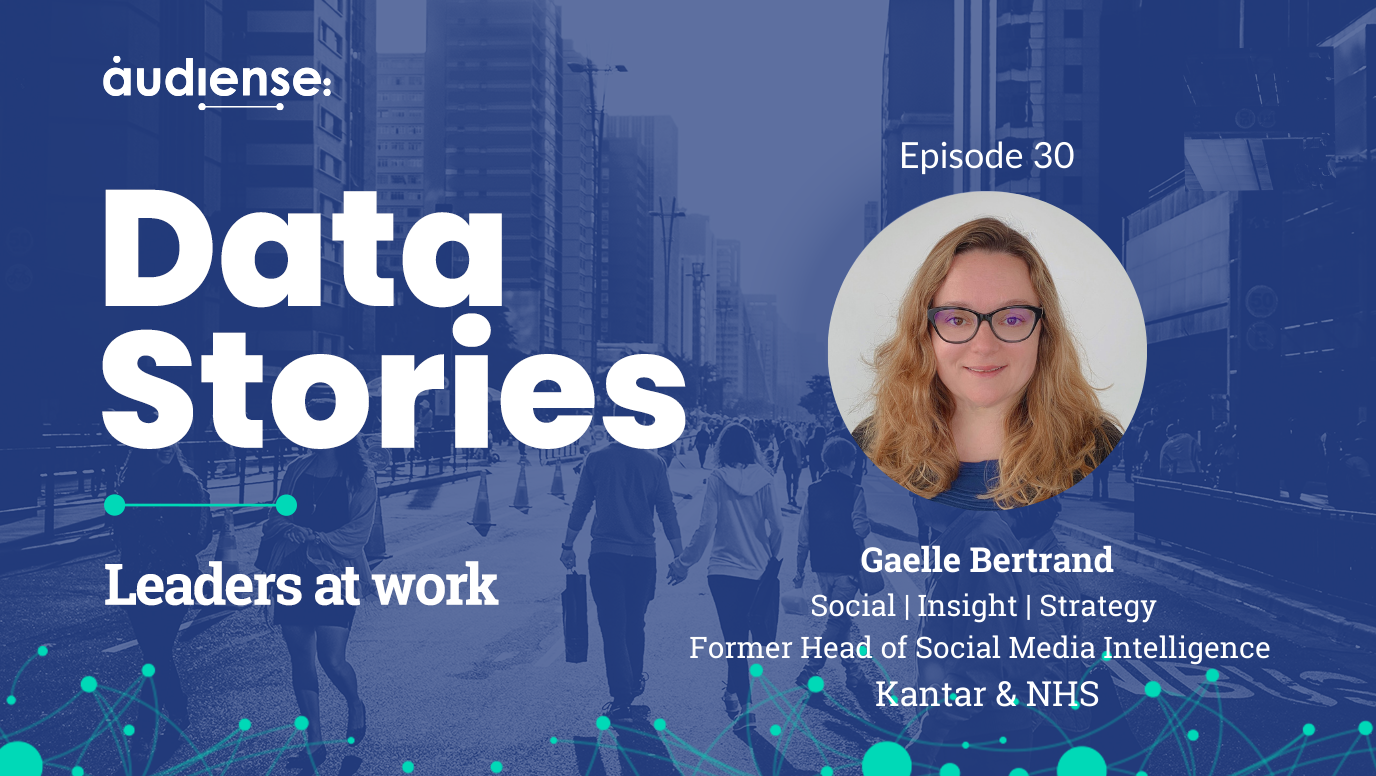[PODCAST] Develop yourself by seizing opportunities when they arrive
Data Stories: Leaders at Work is a weekly podcast brought to you by Audiense. Hosted by Rahul Jerome, founder of insight-intelligence.com, the series captures personal anecdotes and career highlights from some of the most talented and brightest minds in the research and insights industry.
In this episode of Data Stories: Leaders at Work, I talk to Gaelle Bertrand, an insight, strategy, and digital communications professional, ex Kantar and NHS with over 20 years of experience in consumer research and analysis.
First, Gaelle discusses her journey in which she obtained a bachelor’s and master’s degree in marketing, where she gained a particular interest in advertising. Growing up, Gaelle saw herself more in the communications and advertising realm, particularly in music PR. Though this route did not come to fruition, Gaelle mentions that she is a social media ambassador for a record label company as a side gig.
Gaelle stumbled upon a market research position that, in her eyes, was a great stepping stone into the research and insights industry. She admits that even when she took the position, she did not see it as a long-term position, rather something that would help propel her to the next level.
Next, Gaelle shares her experience working on both the client and agency sides of the industry. She explains that the roles are very different – on the client-side, much of the work involves talking to stakeholders and understanding their needs, finding people to do the research, and taking the insights and applying them. She contrasts this to the agency side where most work is focused on the methodology of ‘doing’ rather than the implementation of the research, where researchers are only partly involved. Gaelle also mentions that she enjoyed the implementation and the actionability on the client-side.
When asked why she decided to take the opportunity in NHS, Gaelle mentions she felt she had certain qualities to bring to NHS. Furthermore, entering the health service field during the pandemic was the most opportune time to transition – she has been able to use her expertise in health-related topics including working on vaccination programs.
One thing Gaelle wished she had known before her career was the difficulty in switching trajectories within the field. She explains that one can get pigeonholed in a specialty, which is only advantageous if the person is fully committed to that path. Both avenues – qualitative work and quantitative work – have specific, clear-cut trajectories, so switching can be tricky. Gaelle mentions that had she known this beforehand, she would have either positioned herself differently to be more successful in the industry or not even pursued this research career path.
A few ‘happy accidents’ have occurred in Gaelle’s career, and one of those circumstances occurred when she entered the social data and insights domain in research. She admits that finding this position was partly accidental, especially considering the temporal aspect of the increasing popularity of social media. Gaelle started when social media was on the rise, and she wanted to keep exploring how social media could be a source of insights. Additionally, she feels that this social media aspect of the research will not slow down any time soon. However, due to the rise in AI technology and the unpredictable shifts in the social media market, researchers may need to adapt and transform to the changing landscapes. Regardless, Gaelle is certain that various tools are evolving in a manner in which the research practice becomes easier over time, causing more automation and less human interpretation.
In the next segment, she addresses major life moments in her career and the people who were influential during these changes. First, she mentions that moving into the social media insight realm was a huge segue from being a traditional research practitioner. The work within social media is much different in that she helps organisations shape communication by understanding message, language, tone, and audiences through social media. Gaelle further highlights a few of her bosses that instilled a passion, helped shape her, and inspire her to have confidence, develop methodologies, and be a positive leader in her job.
Gaelle lists three key skills that are necessary to be successful in her field:
1. Be a good technical researcher:
- This is especially important on the agency side; base insight on primary research that you are conducting yourself
2. Be a good consultant in a management consultant way:
- Someone who asks the right questions and not be scared to ask questions to your clients/stakeholders to determine what they want to achieve so you are clear on what they want in the research; your research should build on what they know, not reiterate what they already know.
3. Be a good data analyst:
- Research is moving towards analytics – being a research practitioner is not enough, you need to be a good analyst; in the future, research and analytics will become more connected.
Gaelle shares advice for the younger generation with uncertainties who are just starting a career path. First, she emphasizes the importance of seizing opportunities to develop yourself and not be afraid to take risks even if they do not pay off – you will learn something regardless of the opportunity working out or not. Next, she suggests developing a sense of self-awareness – this will help give you more confidence. Gaelle also cautions the listener to know your limits and do not spread yourself too thin, as well as not being afraid to walk away from a job. She mentions sometimes the best way to get unstuck in a position is to move on. Lastly, Gaelle highlights the importance of having a mentor who works in your industry – their job as the mentor is to advise you and guide you to success.
In the last section, Gaelle shares her personal vision for the future and provides a few pieces of advice to prospective researchers. Gaelle plans to stay in the field, however, she is open to exploring other opportunities within the industry that might pique her interest. Ultimately, she desires a position that will help maintain her research expertise. Regarding prospective researchers, she suggests utilising training resources to develop the skill set necessary for the field. Additionally, speaking to organisations to determine whether the specific field matches the interest is vital. Lastly, networking as much as possible will help build connections and give you more opportunities.
The full version of the podcast with Gaelle Bertrand can be listened here:






